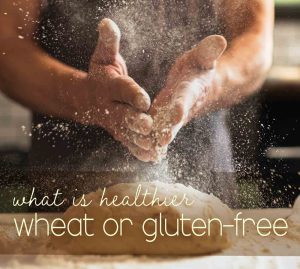Healthy Wheat Flour or Gluten-Free Flour?
Healthy Wheat Flour or Gluten-Free Flour?
Healthy Wheat Flours or Gluten-Free Flour?
Many years ago, I started exploring the idea of going gluten-free. The reason for it stemmed from a food intolerance test that seemed to reflect that I had an sensitivity to wheat. I talked a little bit about that here. Ultimately, all of this information led to the same question, “Should I choose healthy wheat flour or gluten-free?”.
Since then, I’ve written a few gluten-free recipes that have a nice variety of ingredients. However, I have to say, I’ve really had to re-evaluate my thinking several times on the idea of eating gluten-free. Some varieties of gluten-free ingredients can be very inflammatory. If I follow the blood-type diet, my O-type system tends not to utilize wheat as well as an A-type. Therefore, I went ahead and looked at gluten-free substitutions. After awhile, eating too much of those items left me feeling a little bloated or unsatisfied. When I looked at making traditional sourdough, using a heritage non-gmo flour, I found they sat well with me and provided necessary nutrients and digestibility. It was amazing and satisfying.
My conclusion on Non-GMO Healthy Flour or Gluten-Free Flour
The conclusion I am at now is this. Variety! If the ingredients I’m eating are not genetically modified, clean from chemicals and pesticides, organic where possible, fresh as possible, maybe fermented and include simple ingredients, I most certainly will consider eating it! And truthfully, if the Bible says I can eat any deadly thing and it won’t hurt me (Mark 16:18) then I really should not get into fear over it. Knowing that God wants us healthy, I like to look for healthy ingredients. One of those healthy ingredients in today’s world is a non-gmo heritage wheat.
I love using FarmhouseonBoone.com as a resource as she mills all of her wheat for her family at home. You can see her website for further explanation, however these are some common types of grains I feel can be healthy if they are purchased from the right resources.
Types of Whole Grains
Hard White Spring Wheat
The most common grain is Hard White Spring Wheat. You can buy Soft White Spring Wheat and even Soft Red Spring Wheat. Soft wheat is really good for pastries, such as cakes and biscuits. They have a lower gluten content, so the flour is not suited for bread. If you do a lot of baking, I would definitely recommend purchasing both hard and soft wheat.
Here is an example of Hard White Spring Wheat, which would need to be milled to be used as flour. Prairie Gold Organic Hard White Spring Wheat
Einkorn
Einkorn is an ancient wheat grain that is easier to digest and healthier than modern wheat. It is a good source of protein, iron, fiber, and B vitamins. Modern wheat has been genetically altered for higher yields and more gluten. Most people can’t digest modern wheat very well, but are able to digest ancient einkorn much more easily.
Jovial Flour – Eikorn (already milled)
Popcorn
The other grain that can be milled is popcorn. Some mill popcorn into cornmeal to use for cornbread. The popcorn can be put into the NutriMill on the coarsest setting and the popcorn runs right through. Some probably would still find this harder to digest, so always best to find non-gmo/organic varieties as well.
Oats, Rice or Other Gluten-Free Flours
Milling oats to make oat flour and rice for rice flour to make cereals or pancakes is an option as well. Some dishes and cereals that contain rice or oats can be very delicious! I understand that many suffer from Celiac or sensitivity issues. Since I was once one of the sensitivity people, I love to share my opinions. If you are looking for some good gluten-free alternatives, you can look at one of my other blogs.
Sourdough is still the favorite for me, and it is comforting to know that the the flour and the process is more nourishing. There are good quality flours that are gluten-free available, but I would love for you to consider finding a locally sourced heritage wheat flour to better provide the protein, iron, fiber and B vitamins that your body could benefit from.
I have to admit, I love to use Masa Harina flour when I make tortillas! It feels much more authentic even if it it may not be super nutritious or easily digestible!
Equipment ideas/inspiration:
WestonPrice.org article resource
NutriMill for grinding your own flour
Sunrise flour – already milled (wheat)
Jovial all purpose flour (eikorn)
Jovial all purpose (eikorn) smaller
Cover for bowls for Making Sourdough
Weck Jars (for keeping sourdough)
Gluten-free flours for variety:
Some links are affiliate links, which means I make a small commission at no extra cost to you. See more info here.
Healthy Wheat Flours or Gluten-Free Flour? Many years ago, I started exploring the idea of going gluten-free. The reason for it stemmed from a food intolerance test that seemed to reflect that I had an sensitivity to wheat. I talked a little bit about that…
Ingredients
Instructions

Prep time:
Cook time:
Total time:
Servings:
Serving size:
Meal type:
Special Equipment needed:

